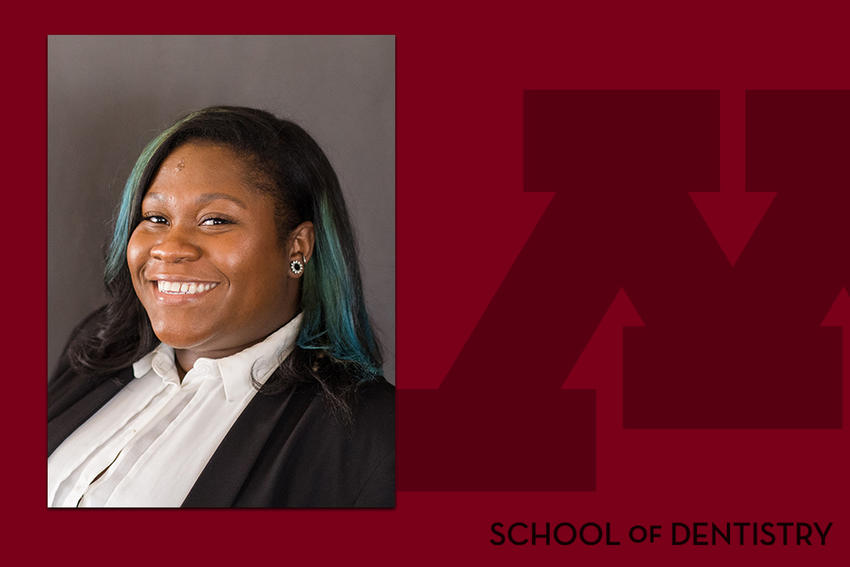Overcoming impostor syndrome through patient-centered care

Jackie Callaway-Campbell, MDT ’21, took a big risk when she moved halfway across the country from Delaware to Minnesota to become a dental therapist. “I’m just a humble girl from the East coast, trying to make her way here in Minnesota,” she joked. “I’m surviving the winters, living for the summers, and looking for a cheese steak.” Almost a year out from graduation, Callaway-Campbell is glad she made the leap.
Today, Callaway-Campbell is working in a joint role as a dental hygienist and dental therapist at a small practice in Delano, Wright County. She provides hygiene and new patient appointments as well as operative care.
The transition from school to licensed practice was challenging, and frightening, at first. Callaway-Campbell has felt impostor syndrome creeping in. “Coming from school, where you always have eyes over your shoulder, to here, where no one is checking my work, was frightening,” she said. “I know the steps, and I know I’m doing the right thing, but having that doubt in my mind was tough.”
A great community has made all the difference. “My team is supportive, my patients are great. I have to remind myself that I know what I’m doing, and my team is confident in me.” Callaway-Campbell has continued to surprise herself with her excellence and efficiency: she is able to successfully complete everything she needs to within the scope of each appointment. Sometimes, when she is working on a high-stakes case, like something involving front teeth, she still surprises herself. “It’s seeing what I’m able to get done at the end of the day,” she said. “I’m still going to have that voice in my head, but seeing what I can do reminds me: you really did earn your degree. You can do this.”
Callaway-Campbell knows she is well-prepared for her role, in part thanks to the incredible support she received during her training at the School of Dentistry. “My instructors and my friends prepared me the most,” she said. “I had instructors who saw that I was capable, but also saw that I didn’t realize how capable I was. They gave me that push.”
And having a community of peers made all the difference. “The best decision I made was to stop working and focus on my education,” she said, reflecting on the decision to quit her part-time job, which she’d maintained for a time while pursuing her degree. In addition to giving her more time to focus on her studies, leaving her job opened up more time to spend with her fellow students in the lab. “That’s where a lot of my learning happened,” she recalled. “We all heard different things from different people, and we put it together to make sense together.”
She still stays in touch with those peers today: they catch up regularly on Zoom and act as a support system for one another. They remind her of the importance of community and relationships—which she sees as one of the defining factors of her job, too.
“The best part of my job is patient-centered care,” she said, explaining that her patients seem very comfortable talking with her frankly and honestly, in a way they might not when the dentist enters the room. “I don’t know what it is, but they are very open with me. They tell me what’s going on, and we can work together to come up with a plan that works specifically for them.”
Callaway-Campbell sees herself as part of a team, both when it comes to care and advocating for her patients. She learns something new every day—about patient care, about medical assistance, about what it means to serve underserved communities. And while she’s not sure where the future will take her, she’s loving the process.
“I act as an advocate, someone who can be with them every step of the way,” she said. “We start with hygiene and education, then working on restorations and follow ups. It’s what I expected: educating, advocacy and doing restorations. But I’m seeing it happen in real time now, and it’s really cool.”